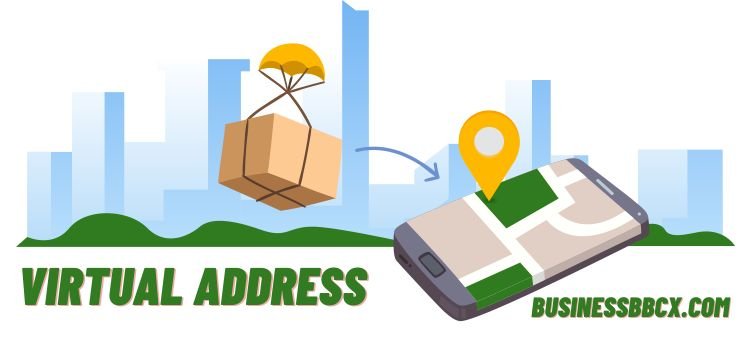In today’s fast-paced and increasingly digital world, businesses are no longer bound by traditional constraints. One of the most transformative tools in this shift is the concept of a virtual address for business. Whether you’re a startup, freelancer, or an established company looking for a flexible solution, virtual addresses are shaping the future of workspaces.
Table of Contents
ToggleWhat is a Virtual Address?

A virtual address is a physical mailing address that businesses can use for official purposes without physically occupying the location. It’s typically provided by professional service providers who manage mail, parcels, and other communications on behalf of the business.
For instance, you could register your business in a prestigious city center or commercial hub, even if your team operates remotely from various locations worldwide.
Why Do Businesses Use Virtual Addresses?
Professional Image
A virtual address in a prime business district creates a strong impression. It signals credibility and professionalism, especially for small businesses or startups operating remotely.
Privacy Protection
Using a virtual address ensures your personal home address isn’t exposed to clients, suppliers, or online directories, safeguarding your privacy.
Cost Efficiency
Renting office space in premium locations can be prohibitively expensive. A virtual address offers the benefits of a prestigious location without the high cost.
Flexibility and Scalability
Businesses can maintain a presence in multiple cities or countries without the logistical challenges of setting up physical offices.
Compliance and Registration
Many countries require a physical address for business registration and licensing. A virtual address fulfills this requirement.
Key Features of a Virtual Address

Mail Handling Services
Service providers typically handle mail collection, forwarding, and scanning, ensuring seamless communication.
Meeting Rooms on Demand
Some virtual address providers offer access to conference rooms or coworking spaces for occasional in-person meetings.
Local Phone Numbers and Call Handling
Many providers offer additional services like local phone numbers and receptionist services.
Who Should Consider a Virtual Address?
Remote-First Businesses
Companies operating entirely online benefit from having a physical address for official communications and customer trust.
Startups and Freelancers
A virtual address offers a cost-effective way to project professionalism without committing to a full-fledged office.
Expanding Businesses
Companies exploring new markets can establish a presence in different cities or countries through virtual addresses.
Digital Nomads
Freelancers and entrepreneurs traveling frequently can use a virtual address to maintain a stable point of contact.
How to Choose the Right Virtual Address Provider

Location: Opt for a provider offering addresses in prestigious or convenient locations.
Services: Check for services like mail forwarding, document scanning, and optional physical workspace access.
Pricing: Compare pricing plans to ensure affordability without compromising on essential features.
Reputation: Research reviews and testimonials to choose a reliable provider.
How to Get a Virtual Address for Your Business
Setting up a virtual address for your business is a simple yet impactful step toward improving professionalism, protecting privacy, and enhancing operational efficiency. Here’s a step-by-step guide to obtaining a virtual address:
Understand Your Needs
Before choosing a virtual address, determine how you intend to use it:
- Business Registration: Does your business require an official address for legal registration or licensing?
- Mail Handling: Will you need mail forwarding, scanning, or storage services?
- Prestige: Are you looking for a prime business district to enhance your professional image?
- Meeting Spaces: Do you need access to physical meeting rooms occasionally?
Understanding these factors will help you select the best provider and package.
Research Virtual Address Providers
Numerous companies offer virtual address services. Compare providers based on:
- Location Options: Look for addresses in reputable business areas or regions relevant to your market.
- Services Provided: Check for mail forwarding, document scanning, meeting rooms, and other add-ons.
- Pricing: Compare costs and subscription plans to ensure they align with your budget.
- Reputation: Read reviews and testimonials to ensure the provider is reliable and secure.
Popular virtual address providers include:
- iPostal1
- Regus
- Anytime Mailbox
- Opus Virtual Offices
- Davinci Virtual
Choose the Right Location
Select a location that aligns with your business goals. For example:
- A prestigious address in a major city can boost your credibility.
- A local address in a target market can help establish a presence in that region.
Consider any legal requirements or regional preferences that might impact your choice.
Sign Up for a Virtual Address Plan
Most providers offer straightforward online sign-up processes:
- Visit the provider’s website.
- Select the location and plan that best suits your needs.
- Provide your business details, including your company name and any specific mail-handling preferences.
- Complete the payment process to activate your virtual address.
Complete Legal Formalities
Depending on your country or region, you may need to complete additional steps:
- Form 1583 (U.S.): In the United States, you may need to file USPS Form 1583 to authorize the provider to receive mail on your behalf.
- Identity Verification: Submit identification documents as required by the provider.
Ensure you understand any regulations regarding the use of virtual addresses in your jurisdiction.
Start Using Your Virtual Address
Once your virtual address is active:
- Update your official business documents, including registrations, licenses, and bank accounts.
- Add the virtual address to your website, email signatures, business cards, and marketing materials.
- Inform clients, partners, and stakeholders about your new address.
Optimize Mail Handling and Services
- Set preferences for how mail is managed—whether you want it scanned, forwarded, or stored.
- Explore additional services like call handling, local phone numbers, or coworking space access if available.
Monitor and Evaluate
Regularly assess whether your virtual address meets your evolving business needs:
- Are the services provided reliable and efficient?
- Is the address helping to enhance your professional image and market presence?
- Do you need to add more locations or upgrade your plan?
Challenges and Considerations

While virtual addresses are incredibly convenient, they come with certain considerations:
- Legal Requirements: Ensure the address meets your country’s business registration and tax requirements.
- Security: Verify the security measures in place for handling sensitive mail or documents.
- Limitations: Some virtual addresses may not be suitable for certain industries or government compliance.
Conclusion: The Future of Workspaces
Virtual addresses are more than a convenience—they’re a necessity for modern businesses embracing flexibility, cost-efficiency, and digital transformation. By allowing companies to establish a professional presence without geographical restrictions, virtual addresses empower businesses to operate in a borderless world.
As the trend towards remote work and digital entrepreneurship continues to grow, virtual addresses will play a critical role in shaping how businesses connect, collaborate, and thrive. If you’re looking to elevate your business while maintaining flexibility, a virtual address might be the perfect solution.
FAQs About Virtual Address for Business
What is a virtual address for business?
A virtual address for business is a physical mailing address that companies can use for official purposes, such as registration, mail handling, and enhancing their professional image, without needing to occupy the location physically.
How does a virtual address for business work?
A virtual address for business works by allowing service providers to receive and manage your mail at a designated address, offering services like mail forwarding, scanning, or holding, while you operate remotely.
Who can benefit from using a virtual address for business?
Freelancers, startups, remote-first companies, and businesses looking to expand into new markets can all benefit from using a virtual address for business as it provides flexibility, cost-efficiency, and a professional presence.
Can I register my company using a virtual address for business?
Yes, in many jurisdictions, you can register your company using a virtual address for business, as it fulfills legal requirements for a physical location while maintaining privacy and professionalism.
What services are typically included with a virtual address for business?
Services typically included with a virtual address for business are mail handling (receiving, scanning, forwarding), meeting room access, local phone numbers, and sometimes receptionist services.
How much does a virtual address for business cost?
The cost of a virtual address for business varies depending on the location and services offered, with prices typically ranging from affordable monthly plans to premium packages for prestigious addresses.


